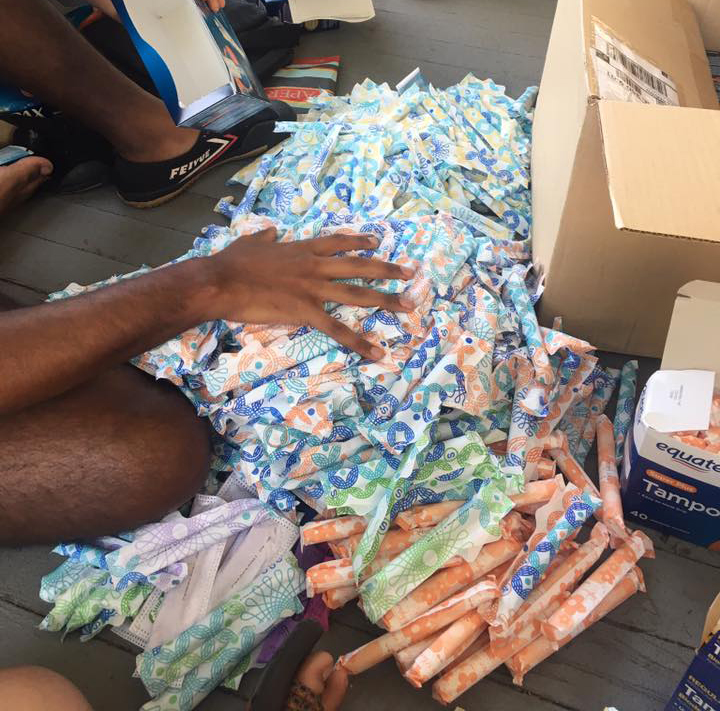Period brings ‘menstrual movement’
PHOTO COURTESY OF GREATER BIRMINGHAM PERIOD
 The Greater Birmingham Period gathers menstrual hygiene supplies to give out at Linn Park.
The Greater Birmingham Period gathers menstrual hygiene supplies to give out at Linn Park.
PHOTO COURTESY OF GREATER BIRMINGHAM PERIOD
 The Greater Birmingham Period gathers menstrual hygiene supplies to give out at Linn Park.
The Greater Birmingham Period gathers menstrual hygiene supplies to give out at Linn Park.Ceri-Lune Renneboog
CityLifestyle Editor
cerilune@uab.edu
Period products are taxed as luxury items in most of the fifty States, making their prices even more inaccessible to thousands of people with periods throughout the country. Despite menstruation being another biological bodily function, antiquated laws still perpetuate necessary hygiene products as items of comfort, rather than items of need.
Period, a non-profit organization labeling themselves as the “menstrual movement,” is hoping to combat the stigmatization of menses and the accessibility of period products across campuses all over the U.S. The Period movement focuses primarily on starting chapters on campus, leaving a disparity for many menstruators outside of college campuses.
Greater Birmingham Period was started to combat period poverty at all levels regardless of educational or socioeconomic status. Due to misperceptions about periods and unfair legislation regarding reproductive health, thousands of people, particularly houseless and incarcerated populations, lack proper access to affordable hygiene products regardless of their cost. Greater Birmingham Period was started by Lillie and Asher Stubsten, founders of Birmingham’s Free Store, to further bring inclusivity to the Period movement.
“Our mission is to provide for people’s reproductive and sexual health needs in a way that is radically generous, anti-capitalist, queer-affirming and anti-racist,” said Asher Stubsten, co-founder of GBP. “We hold an empathetic place for all people.”
The organization meets at Linn Park once a month to dispense free period product packages to people who otherwise don’t have regular access to them. The organization has several goals, and while offering free products is the groups primary focus, they also want to help orchestrate legislative change in regard to period policies in order to make policies more trans-inclusive as well as making products more accessible.
“It’s so much more than what we do in the park,” Asher said. “We are specifically creating a space for trans-menstruaters. We want to go beyond women’s shelters and women’s bathrooms.”
The Greater Birmingham Period relies on the community for donations, preferably in the form of pads and tampons, though also encourages donations of condoms, and diapers.
“It’s mutual aid,” Lillie Stubsten said. “The community gives and the community takes.”
Greater Birmingham Period works to destigmatize menstruation through the help of their Red Rag Zine. The miniature ‘magazine’ features stories, poems and art from local menstruators and the experiences and struggles with they have had with their periods.
“One of our main pillars is ending the stigma around periods,” Lillie said. “We want people to talk about it.”
The organization is currently accepting submissions for their October Halloween Red Rag Zine through their Facebook page. Lillie and Asher Stubsten are also the founders of Birmingham Free Store, founded in collaboration with Greater Birmingham Period, which provides the city’s residents with free access to clothes, toiletries, books, and much more.
“With both organizations, we serve folks with radical generosity,” Lillie said.
The Free Store and Greater Birmingham Period will both hold their next event next Sunday, October 28 in Linn Park from 1 to 3 p.m. during which the organizations will be handing out free period packages and offering a collection of free items for those otherwise lacking access to them.
“Greater Birmingham Period is an amazing organization and their model of radical generosity has accomplished a lot in a very short time,” said Mark Linn, graduate student and volunteer for the Birmingham Free Store.
To donate to Greater Birmingham Period, or the Birmingham Free Store, contact Lillie Stubsten via Facebook. GBP is currently accepting all donations of tampons, pads, condoms and diapers; the Free Store is accepting clothing, books, art supplies, toiletries, backpacks, handbags and home goods.


